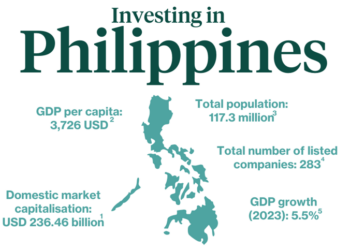No products in the basket.
Ferdinand Marcos Jr is set to become President of the Philippines and Sara Duterte, the daughter of the current President, Rodrigo Duterte, is set to become Vice President.
Foreign investors are expected to resort to a wait-and-see approach since the President-elect has not made his economic policies clear. The immediate challenges facing Marcos Jr include the Philippines’ high budget deficit, income inequality, and balancing relations between the US and China. Putting the colorful family legacy aside, a question on everybody’s minds is whether Marcos Jr will continue some of Duterte’s flagship economic programs, such as infrastructure spending under the Build, Build, Build program.
On May 9, 2022, Filipinos went to the polls to choose their next president and vice president in what has been touted as the most significant election in the country’s history. Unofficial results show that Ferdinand ‘Bongbong’ Marcos Jr, son of former strongman President Ferdinand Marcos Sr, captured 31 million votes, double that of his closest rival, the current Vice President Leni Robredo who had some 14 million votes. Some 67.5 million were eligible to vote in this year’s elections.
Foreign investors are expected to resort to a wait-and-see approach, particularly since the President-elect has not made his economic policies clear. What is clear is that the new President will inherit a country with immediate and long-standing challenges, which include an economy battered by the pandemic, a record national debt of PHP 11.7 trillion (US$232 billion), deep poverty, and increasing inequality.
President Ferdinand Marcos Sr was elected in 1965 before declaring martial law in 1972 to suppress the threat of a communist takeover and civil strife following a series of bombings in Manila. Though it was formally lifted in 1981, the powers granted under martial law continued to be granted to the President for the duration of his presidency. Allegations of human rights abuses and mass corruption led to a People Power Revolution in 1986, which removed him from power. He and his family fled to Hawaii where hundreds of criminal and civil cases were filed against him and his family as they were accused of amassing a fortune worth about US$10 billion through ill-gotten gains.
Under his presidency, the Philippines saw a growth rate rise, peaking at nine percent in 1973 and 1976. He pursued an aggressive infrastructure program, funded by foreign debt that would lead to an inflationary crisis in the latter years of his presidency. The economy contracted by as much as 7.3 percent in 1984 and 1985. External debt ballooned from US$599 million at the start of his presidency to over US$28.3 billion when he fled into exile — amounting to 80 percent of the GDP.
Ferdinand Marcos Sr died in Hawaii on September 28, 1989.
Bongbong Marcos was elected as Vice Governor of Ilocos Norte province in 1980, a stronghold of the Marcos family. He became Governor of the province in 1983, before the revolution, taking over from his aunt who had held power for over a decade. Upon the family’s return to the Philippines, Bongbong was elected to the House of Representatives in 1992, from where he began his decades-long effort to attain the presidency. He suffered a setback in 2016 when his Vice-Presidential bid came up short to the current Vice President Leni Robredo.
Bongbong Marcos filed a protest to the country’s Supreme Court to contest the results. The Supreme Court dismissed his protest.
The Marcos campaign has offered little in terms of policies on how to tackle the myriad of problems in the Philippines. The benchmark Philippine index dropped amid a selloff as investors wait for Marcos Jr’s economic plans. The selloff erased as much as US$9.3 billion on May 10, 2022. The Marcos Jr campaign has focused on the theme of ‘unity’. Bongbong snubbed invitations to partake in pre-election debates, and rarely gave interviews; even his campaign website contains no clear overview of any policy pledges.
This article was first published by AseanBriefing which is produced by Dezan Shira & Associates. The firm assists foreign investors throughout Asia from offices across the world, including in in China, Hong Kong, Vietnam, Singapore, India, and Russia. Readers may write to [email protected].
Discover more from Thailand Business News
Subscribe to get the latest posts sent to your email.














